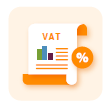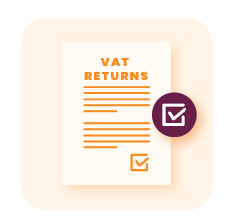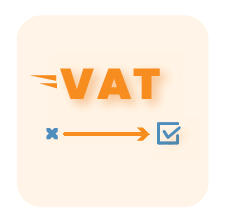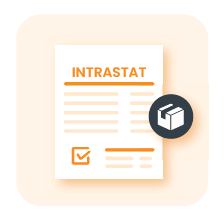Reverse Charge & “Call Off Stock” in Austria
Leveraging the reverse-charge mechanism shifts the supplier’s tax obligation to the supply recipient. The recipient thus becomes responsible for determining the applicable VAT.
The recipient has the ability to claim the reported VAT in their preliminary VAT return as input tax, up to the allowable input tax deductions. In Austria, the supplier is mandated to issue invoices that are exempt from VAT. Consequently, only the net amount is invoiced by the taxable person. Moreover, it is imperative for the entrepreneur to annotate on the invoice that the reverse charge is applicable and that the recipient bears responsibility for the Austrian VAT.
Read more about Reverse Charge and “Call-off stock” in Austria in our comprehensive guide.
Selling in Austria?
Austria – “Call off stock”
Simplification of the EU Call-Off Stock Rules
As of January 1, 2020, call-off stock arrangements have been standardized across EU member states. Austria has incorporated the directives governing these arrangements into certain articles within the Single Market Regulations. With the simplification rule, the transfer of goods from one EU Member State to another doesn’t constitute a taxable transaction. Instead, the taxable event occurs during the subsequent transfer of ownership. The initial movement of goods is recognized as an intra-community supply on the part of the supplier and treated as an intra-community acquisition by the recipient.
Call-off stock rules are applicable solely to arrangements that satisfy the following criteria:
- Goods are transferred to another Member State either directly by the supplier or through a third party acting on their behalf. This transfer is executed with the intention of supplying goods to a recipient who will later obtain ownership per an existing agreement among the involved parties.
- The supplier neither has an establishment nor a fixed base in the Member State where the goods are transferred.
- The recipient, who will eventually acquire ownership of the goods, must have VAT registration in the Member State receiving the goods.
- Suppliers must maintain a ‘call-off stock register’ documenting the goods transfer, supporting the claim for call-off stock simplification. This transfer must also be recorded in the EC Sales List (ESL), with proper identification of the recipient and the VAT ID assigned to them in the Member State receiving the goods.
- The final supply to the intended recipient at the consigned location must transpire within 12 months of the goods’ arrival.
If all the outlined conditions are met, the application of the call-off stock regime becomes mandatory.
Download the Austrian VAT guide
Austria – Import VAT
In Austria, import VAT is a specific category of VAT imposed by Customs authorities on goods brought in from countries outside the EU. The import VAT is applied to the cumulative value of the imported items, transportation costs, customs duties, consumption tax, and internal EU transportation expenses. The standard rate for this VAT is 20%, but under certain conditions, reduced rates of 13%, 10%, or 5% may be applied.
Businesses have the opportunity to recover the import tax they’ve paid, provided they possess the original import tax documentation. This recovery can be claimed in the business’s VAT return. Alternatively, if a company has no taxable sales in Austria, the refund can be pursued through the VAT refund procedure.
Exemption from Import VAT
Certain goods imported into Austria are exempt from import VAT. These exemptions apply to goods that, if sold within the country, would also be free from VAT. The Austrian VAT Act also outlines exemptions for specific kinds of goods (subject to particular conditions and restrictions) from import VAT. These exempt goods include:
- Capital goods associated with business activities transferred from foreign countries.
- Goods temporarily exported and then re-imported.
- Goods imported for the purpose of promoting trade.
- Items brought into the country for examination or testing purposes.
- Specific goods related to health.
- Certain items imported by charitable organizations.
- Goods whose importation essentially constitutes intra-community supply.
Deferral of the Austria import VAT
Upon the arrival of goods in the country, VAT on importation is due immediately. Nevertheless, a taxable individual, if registered for VAT in Austria, can opt for deferred accounting through the VAT return. In this scenario, the taxable individual will get monthly invoices from the customs administration for the importations conducted. Payment deferral for both VAT and customs can also be arranged under the following circumstances:
- There is a reliable accounting of the imports
- There were no customs offenses made in the past
- There is an appropriate collateral for the payables to be paid at a later date
Before implementation, the customs authority must approve the application for deferral. Import duties should be documented by the 5th and are due for payment by the 15th of the subsequent month.
Last Updated: 12/10/2023
Disclaimer
The information provided by Global VAT Compliance B.V. on this webpage is intended for general informational purposes only. Global VAT Compliance B.V. is not responsible for the accuracy of the information on these pages, and cannot be held liable for claims or losses deriving from the use of this information. If you wish to receive VAT related information please contact our experts at support@gvc.tax








